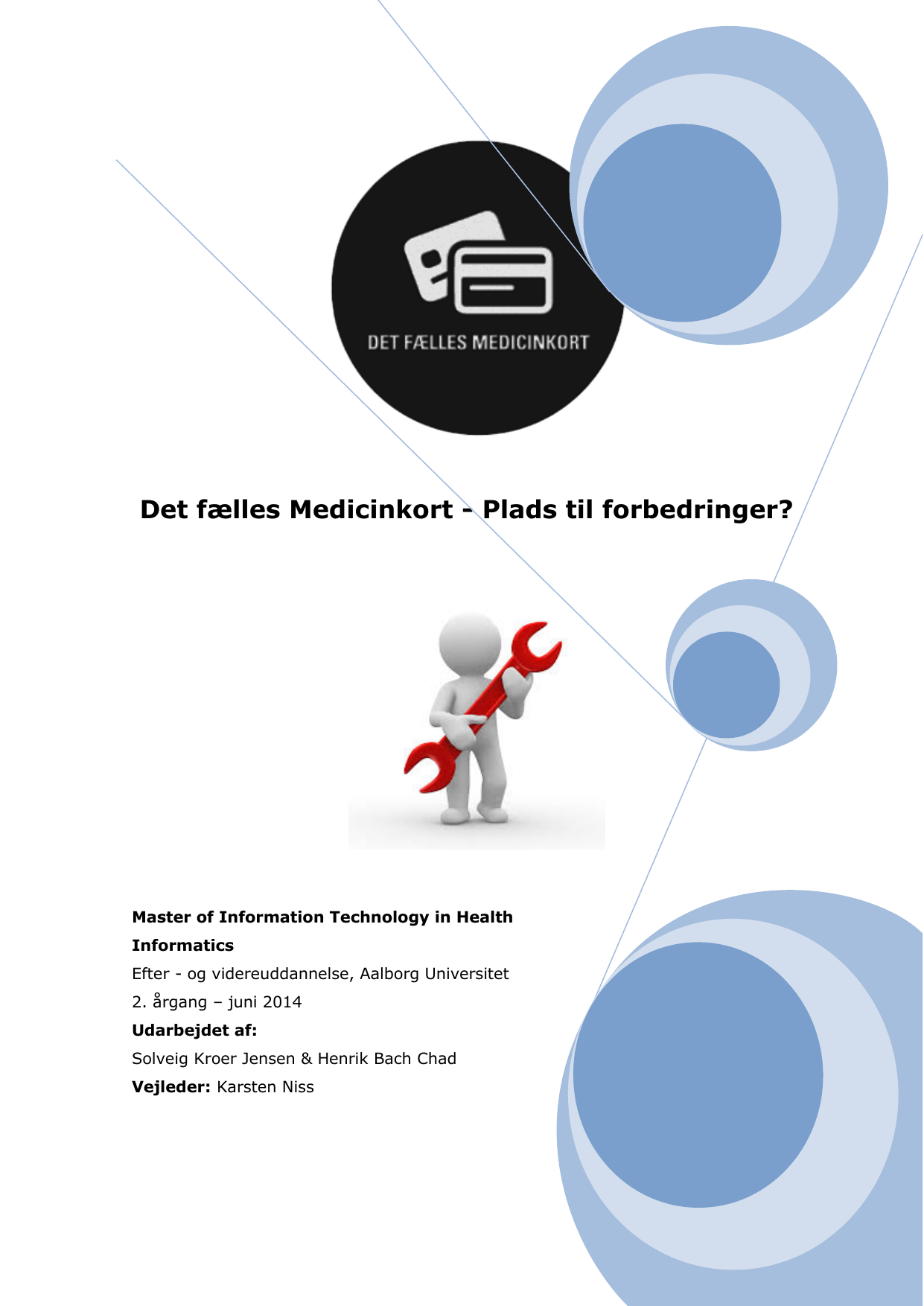
Det fælles Medicinkort - Plads til forbedringer?
Oversat titel
The Common Medication Card - Room for improvement
Forfattere
Semester
2. årgang
Udgivelsesår
2014
Afleveret
2014-06-08
Antal sider
90
Abstract
Resumé Baggrund: I 1. års projektet ”Det fælles Medicinkort – En fantastisk idé?”, forsøgte vi at afdække årsagerne til det store antal utilsigtede hændelser i forbindelse med anvendelsen af FMK på Aalborg Universitetshospital. Udarbejdelsen af 1. års projektet og de svar dette gav, affødte en nysgerrighed, som vi ønskede at arbejde videre med, denne gang med fokus på implementeringsprocessen af FMK. Problemformulering: Hvilke årsager kan ligge til grund for at implementeringen af FMK har været problematisk, og hvordan kan denne viden anvendes i lignende implementeringsprojekter i fremtiden? Metode: Med udgangspunkt i dokumentanalyse af det foreliggende materiale omkring implementeringen af FMK på Aalborg Universitetshospital har vi anvendt Grounded Theory metoden til at afdække og finde svar på den første del af vores problemformulering. I besvarelsen af anden del af problemformuleringen har vi foretaget ”theoretical integration”, hvor fundene fra første del sammenlignes med kendt litteratur indenfor de områder, vi fandt i første del. Dette for herigennem at give anbefalinger til, hvordan lignende implementeringsprojekter kan gribes an i fremtiden. Konklusion: I gennemgangen af dokumenterne konstaterede vi, at der ligger flere forskellige årsager til grund for den problematiske implementering af FMK på Aalborg Universitetshospital. En årsag er bl.a. et stort antal af ansvarlige aktører, og mangel på en decideret styrende koalition, der styrer processen. Den manglende brugerinddragelse i forbindelse med implementeringsprocessen samt kulturen i organisationen er endvidere væsentlige årsager til problematikken. I lignende implementeringsprojekter i fremtiden anbefaler vi, at man tidligt i forløbet får sammensat en stærk styrende koalition, indeholdende personer med de rette kvalifikationer til opgaven. Der skal endvidere være en væsentlig højere grad af brugerinddragelse i processen, og der kan med fordel foretages en kulturanalyse, for herigennem at få indblik i de kulturelle forskelle der hersker i organisationen. Ovenstående er faktorer, der kan være med til at mindske modstanden mod den forandring en implementeringsproces medfører i organisationen. Vi anbefaler at tage udgangspunkt i organisationsteoretikeren John P. Kotters forandringsteori indeholdende en otte trins model for herigennem at sikre en succesrig implementeringsproces. Perspektivering: Implementeringsprocessen af FMK på Aalborg Universitetshospital kan af gode grunde ikke laves om, men hvad kan gøres i igangværende projekter for at få succes? To metoder, der i øjeblikket arbejdes med i praksis for at forbedre arbejdsgange, er ”Model for Improvement” og LEAN tankegangen, hvilket vi tænker kan være anvendelige.
Abstract Background: In our first year project ” The Common Medication Card – A fantastic idea?” we tried to uncover the reasons for the large number of incidental events relating to the use of the Common Medication Card at Aalborg University Hospital. While working on this project we found some answers that triggered our curiosity that made us wanting to keep working with The Common Medication Record. This time focusing on the implementation process. Research question: What could be the reasons for the problematic implementation of the Common Medication Card and how can this knowledge be used in similar implementation projects in the future? Method: Based on documentary analysis of the available material regarding the implementation of the Common Medication Card at Aalborg University Hospital we have used the Grounded Theory method to identify and find the answers to the first part of our research question. In answering the second part of the research question, we have used "theoretical integration", where the findings from the first part of the study are compared to well known literature to provide recommendations for how similar implementation projects can be approached in the future. Conclusion: When reviewing our documents we found that there are several reasons underlying the problematic implementation of the Common Medication Card at Aalborg University Hospital. One reason, among other things, is a large number of responsible people, and lack of an actual coalition that should be leading the process. The lack of user involvement in the implementation process as well as the culture in the organization is also major causes for the problem. For similar implementation projects in the future, we recommend that you early in the process put together a strong and dynamic coalition including people with the correct skills for the job. There must also be a significantly higher degree of user involvement in the process and it would be beneficial to make a culture analysis to gain insight into any cultural differences there may be in the organization. The above mentioned factors will help reduce the problems of change an implementation process could have in the organization. We recommend to start with organization theoretician Kotters change theory including an eight step model to ensure a successful implementation process. Perspectives: The implementation process of the Common Medication Card at Aalborg University Hospital can for good reasons not be changed but what can be done in ongoing projects to be successful? We suggest two methods that are currently being worked on in practice to improve workflows which are "Model for Improvement" and the LEAN mindset which we think can be useful.
Emneord
